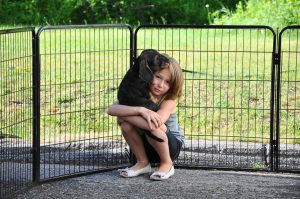March 30th, 2019 — Breeders do not always get the recognition they deserve. Some people wrongfully believe that breeders are “making money off the backs” of animals. In fact, this theory is not always true, because there are breeders who carefully follow the rules.
Sleeping beside a maternity pen for two weeks to make sure the little ones are doing well is the symbol of a super conscientious breeder. Giving up vacations to take care of a sick newborn is an act of utter selflessness. As well, loosing 16 pounds to oversee two deliveries taking place during the same night deserves very special recognition.
That has been part of Louise La Branche’s life, breeder of Standard Wire-Haired Teckels (Dachshunds) (of European lines) at Vom Branche Kennel for the last ten years. For her, being a breeder is first and foremost a passion. To think that she is printing money as fast as a copy machine is simply a figment of the imagination. Only unscrupulous breeders who bend the rules can make that much money. A look inside a world that deserves to be recognized.
The costs associated with good breeding practices would discourage many to venture into those waters. In addition to food, accessories, toys and other veterinarian related fees, some breeders also rely on DNA tests to make sure their animals are not carriers of a mutated gene. This test costs $75.
There are numerous purebred animals in the Province of Québec that are carriers of mutated copies of the gene linked to genetic diseases. To detect these abnormalities, DNA testing is required, especially for breeding purposes. This is the only way to make sure this double mutation will eventually disappear and that at least one of the two parents carries one healthy gene. That way, many of the puppies are born ‘clear’ so much so that they will become themselves excellent candidates for reproduction. That being said, genetic diseases are not present in every kennel.
Education is Key
“Unfortunately, these mutations will continue for many years because there is still a lot of educating to do”, says Dr. David W. Silversides, Full Professor at the Faculté de médecine vétérinaire of Université de Montréal, and Scientific Director at Labgenvet. This laboratory provides an online list of genetic diseases affecting purebred dogs and cats. It’s a real dictionary with clear definitions.
Louise La Branche
Of course, the cost of a purebred animal tested for genetic disorders is higher. Louise La Branche confirms it. Her Teckels may be affected by a Progressive Retinal Atrophy (PRA). To find out if her dogs were carriers of one (and even two) mutated copy of the gene causing this illness, she collected saliva samples on her dogs’ gums, and sent them to Labgenvet for DNA testing. “I can now confirm with absolute certainty that my dogs are ‘Clear’; there are neither carriers nor ill”, she said.
Having healthy purebred animals is one thing but proper breed management is another. The dogs at Vom Branche Kennel are registered with the Canadian Kennel Club as well as the Deutscher Teckelklub (DTK) 1888 e. V in Germany. To comply with DTK standards, strict rules with respect to breeding, temperament and breed standards must be followed. For breeding purposes, a male or a female must have obtained an ‘Excellent’ or ‘Very Good’ (in conformance) mention. Breeding is not allowed before the dogs are 15 months old. After giving birth, there is a waiting period of 10 months before subsequent breeding is allowed. In addition to these two mentions, these Teckels must have successfully completed an obedience test or a hunting test.
Proper management also means that animals are well-socialized and weaned long enough. Nobody wants an animal that is fearful or that reacts badly in the presence of other animals or human beings. For the success of this crucial aspect, the animal should not leave for its new home before the age of eight weeks, minimally. Another important thing to know: Adopting a purebred dog means there will be a waiting period. “Beware of breeders advertising online and where animals are available on request. It could be a puppy mill”, warns Louise La Branche, who is also a retired police officer. Of course, not everyone advertising online is an outlaw.
Finding a Responsible Breeder
Too often, consumers looking for a purebred animal are also looking for the best price. “They can also be misinformed or not put enough efforts to learn more about the breed. That being said, there are dog sellers and dog breeders”, she thinks. Unlike the first category, Louise La Branche thinks breeders should make themselves available throughout the life of the animal, so owners can get answers to their questions and even get assistance if need be.
In addition, responsible breeders will not sell their animals to just anyone. For example, someone who doesn’t have a fenced yard will not be able to adopt a dog at Vom Branche Kennel. A dog spending part of its life tied outside the house is not acceptable. For good physical and mental health, an animal needs to run freely.
Compatible Dogs and Adopters
Moreover, reputable breeders should be able to perceive the nature of an adopter and find a dog with a similar temperament. Someone with a strong personality will be matched with a dog that has a strong personality. The animal will then be able to tolerate its master’s temperament. As for the hypersensitive and Asperger, they should be matched with a dog that exudes confidence without being dominant.
 To conclude, Louise La Branche thinks the priority of a good breeder should be the animal. “If there is a slightest doubt in my mind about a potential adopter, I prefer to say no rather than being wrong”. Even if her dogs have a new home, they will always be part of her life. Being a breeder is not only about animals being born, it also involves a strong discipline, a great sense of responsibility as well as being a good listener. Three qualities that make a difference and show an unwavering commitment to animal welfare.
To conclude, Louise La Branche thinks the priority of a good breeder should be the animal. “If there is a slightest doubt in my mind about a potential adopter, I prefer to say no rather than being wrong”. Even if her dogs have a new home, they will always be part of her life. Being a breeder is not only about animals being born, it also involves a strong discipline, a great sense of responsibility as well as being a good listener. Three qualities that make a difference and show an unwavering commitment to animal welfare.
Photos: Courtesy of Vom Branche Kennel
All rights reserved.
Do you like this article? Like us on Facebook





